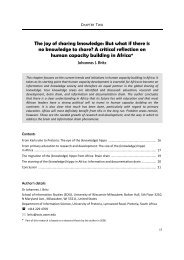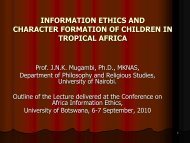Ethical Dimensions of the <strong>Information</strong> Scoiety: Implications for <strong>Africa</strong>perhaps a need to revert to the fundamentals of ethical theories to help provide a systematicapproach and understand<strong>in</strong>g the debates surround<strong>in</strong>g WikiLeaks.10. Ethical dimension of <strong>Information</strong> Society: Implications for <strong>Africa</strong><strong>Africa</strong> has unique challenges of an ethical nature <strong>in</strong> the <strong>Information</strong> Society. Capurro (2010) observesthat ethics, <strong>in</strong> general, and <strong>Information</strong> <strong>Ethics</strong> <strong>in</strong> particular, is a young academic field <strong>in</strong> <strong>Africa</strong>. Heattributes this to the fact that not much has been published on the role that <strong>Africa</strong>n philosophy canplay <strong>in</strong> th<strong>in</strong>k<strong>in</strong>g about the challenges aris<strong>in</strong>g from the impact of ICTs on <strong>Africa</strong>n societies and cultures.Capurro (2008) further po<strong>in</strong>ts out that because ubuntu pr<strong>in</strong>ciples have underp<strong>in</strong>ned the <strong>Africa</strong>nRenaissance, Black Economic Empowerment, corporate governance and conflict resolution, similarpr<strong>in</strong>ciples or philosophies should be foundational to the <strong>Africa</strong>n ethical and moral traditions. Thewidely used Eurocentric ethical traditions such as consequentialism, deontology and virtue-basedtheories do not sit well with <strong>Africa</strong>n traditions. Ocholla (2011) expla<strong>in</strong>s that consequentialismemphasises outcomes, while duty-based theories or deontology emphasises rules. Virtue-basedtheories, on the other hand, place emphasis on the character of the personal moral agent. Thedom<strong>in</strong>ance and use of Eurocentric ethical traditions <strong>in</strong> study<strong>in</strong>g <strong>Africa</strong>n philosophy is be<strong>in</strong>g challengedby <strong>Africa</strong>n scholars who realise that <strong>Africa</strong>n ethical and moral traditions cannot adequately be<strong>in</strong>vestigated or studied through an exotic lens.The quest for harness<strong>in</strong>g <strong>Information</strong> <strong>Ethics</strong> tradition <strong>in</strong> <strong>Africa</strong> is gather<strong>in</strong>g pace catalysed bythe WSIS Action L<strong>in</strong>e C10. However, the technological revolution brought by mobile communicationand now social media, is tak<strong>in</strong>g place <strong>in</strong> an environment where there is little <strong>in</strong>tegration of <strong>Information</strong><strong>Ethics</strong> <strong>in</strong> the education curriculum (Mutula & Braman, 2011). Conway (n.d.) observes that the field ofscholarship and teach<strong>in</strong>g of <strong>Information</strong> <strong>Ethics</strong> is concentrated <strong>in</strong> developed economies such asGermany, Japan, the United K<strong>in</strong>gdom and the United States, with <strong>Africa</strong> lagg<strong>in</strong>g beh<strong>in</strong>d. The laggardposition of <strong>Africa</strong> with regard to <strong>Information</strong> <strong>Ethics</strong> has caused <strong>Africa</strong>n scholars to make proactiveattempts to <strong>in</strong>fuse <strong>Information</strong> <strong>Ethics</strong> <strong>in</strong> the education curriculum, especially at the university level.Besides <strong>Information</strong> <strong>Ethics</strong>, ethical aspects of e-Government <strong>in</strong> <strong>Africa</strong> have been extensivelydiscussed by <strong>Africa</strong>n scholars and recommendations have been made to national government foraction. The first <strong>Africa</strong>n Conference on <strong>Information</strong> <strong>Ethics</strong> was held <strong>in</strong> February 2007 <strong>in</strong> Tshwane,South <strong>Africa</strong>, to discuss the impact of the use of modern <strong>Information</strong> and CommunicationTechnologies (ICTs) on the <strong>Africa</strong>n cont<strong>in</strong>ent. This was followed by the high-level Workshop on <strong>Ethics</strong>and e-Government <strong>in</strong> February 2009 that was held <strong>in</strong> Pretoria and addressed, among other subjects,global perspectives of <strong>Information</strong> <strong>Ethics</strong> with regard to transparency, secrecy, trust, rights,responsibilities, and accountability. The third <strong>Information</strong> <strong>Ethics</strong> forum followed and was held at theUniversity of Botswana <strong>in</strong> September 2010, result<strong>in</strong>g <strong>in</strong> the development of an <strong>Information</strong> <strong>Ethics</strong> toolkit for the <strong>Information</strong> <strong>Ethics</strong> curriculum. The fourth forum of <strong>Information</strong> <strong>Ethics</strong> <strong>in</strong> <strong>Africa</strong> was held <strong>in</strong>September 2011 at the University of Pretoria focus<strong>in</strong>g on generat<strong>in</strong>g an <strong>Information</strong> <strong>Ethics</strong> curriculumfor undergraduate study at the university (Mutula, 2011). The fifth workshop on <strong>Information</strong> <strong>Ethics</strong>focus<strong>in</strong>g on social media was held <strong>in</strong> Nairobi, Kenya, on 3 June 2012. The sixth conference followedon 3 - 7 September 2012 at Kievits Kroon Conference Centre, Pretoria, which further elaborated onthe responsible use of social media <strong>in</strong> <strong>Africa</strong>.Despite the current efforts to <strong>in</strong>stitutionalise <strong>Information</strong> <strong>Ethics</strong> <strong>in</strong> <strong>Africa</strong>, there is also a rag<strong>in</strong>gdebate about the prudence of focus<strong>in</strong>g on ‘<strong>Africa</strong>n <strong>Information</strong> <strong>Ethics</strong>’ and/or ‘<strong>Information</strong> <strong>Ethics</strong> for<strong>Africa</strong>’. Ocholla (2011) poses the question: “Should <strong>Africa</strong>n <strong>Information</strong> <strong>Ethics</strong> be unique”? In contrast,Gordana and Hofkirchner (2011) ask: “Are comput<strong>in</strong>g ethics issues unique or are they simply moralissues that happen to <strong>in</strong>volve ICT?” Carbo (n.d.) asserts that each <strong>in</strong>dividual belongs to a number ofdifferent cultures at different levels, such as liv<strong>in</strong>g <strong>in</strong> one country; speak<strong>in</strong>g different languages; andPage 37
S.M. Mutulaadher<strong>in</strong>g to policies and practices of different religions and political parties. Gorniak-Kocikowska(1996) argues that the diverse ethical systems embedded <strong>in</strong> other cultures of the world all derive fromlocal histories and customs and are unlikely to be applicable worldwide. Mason (1986), whileunderscor<strong>in</strong>g the importance of <strong>in</strong>tellectual property, regrets that current protocols regard<strong>in</strong>glegitimate rights of the people have not effectively espoused <strong>in</strong>digenous knowledge. Hoesle (1992)states that computerised <strong>in</strong>formation systems’ use requires people to act and th<strong>in</strong>k <strong>in</strong> prescribed waysthat privilege Western cultural traditions because of the orig<strong>in</strong> of computers <strong>in</strong> these cultures, whilemarg<strong>in</strong>alis<strong>in</strong>g the cultural traditions of others. Capurro (2010) observes that sensitivity to a diversity ofcultural traditions and local contexts is needed when consider<strong>in</strong>g the impact of ICTs.Floridi (1999) po<strong>in</strong>ts out that the <strong>Information</strong> <strong>Ethics</strong> theory of ‘macro-ethics’ was designed toaddress all ethical situations <strong>in</strong> all traditions. Floridi's argument is that everyth<strong>in</strong>g which exists can bedescribed as an <strong>in</strong>formation object and that all <strong>in</strong>formation objects have <strong>in</strong>tr<strong>in</strong>sic value and thereforedeserve moral respect (Brey, 2008). However, this viewpo<strong>in</strong>t has been criticised because s<strong>in</strong>cepeople do not normally seem to assign <strong>in</strong>tr<strong>in</strong>sic value to <strong>in</strong>formation objects, strong arguments mustbe adduced for us to start valu<strong>in</strong>g them as such (Brey, 2008). Besides, Floridi fails to provide anobjectivist ontology for <strong>in</strong>formation objects’ properties because, as Brey (2008) po<strong>in</strong>ts out, such<strong>in</strong>formation properties must be <strong>in</strong>alienable and not subjective and cont<strong>in</strong>gent. Floridi’s macro-ethicstherefore falls short of a universalist theory and is not suitable <strong>in</strong> expla<strong>in</strong><strong>in</strong>g and study<strong>in</strong>g ‘<strong>Africa</strong>n<strong>Information</strong> <strong>Ethics</strong>’.Therefore, current efforts by <strong>Africa</strong>n scholars to entrench <strong>Information</strong> <strong>Ethics</strong> <strong>in</strong> the educationcurriculum, founded on <strong>Africa</strong>n traditions, are well <strong>in</strong>tentioned and could go a long way <strong>in</strong> re/validat<strong>in</strong>g<strong>in</strong>digenous ways of th<strong>in</strong>k<strong>in</strong>g which, hitherto, have been overshadowed by the cont<strong>in</strong>ent’s colonial pastand Eurocentric or Western ethical traditions such as that of Floridi. Through the ongo<strong>in</strong>g debate on‘<strong>Africa</strong>n <strong>Information</strong> <strong>Ethics</strong>’ and/or ‘<strong>Information</strong> <strong>Ethics</strong> for <strong>Africa</strong>’, <strong>Africa</strong>n scholarship has a uniqueopportunity to solidify a knowledge system based on <strong>Africa</strong>n realities <strong>in</strong> the <strong>Information</strong> Society.However, the aim should not be to isolate <strong>Africa</strong>n values from the global culture, but rather to develop<strong>Information</strong> <strong>Ethics</strong> models that have wider applicability and validity beyond national, regional andcont<strong>in</strong>ental boundaries. The <strong>Information</strong> <strong>Ethics</strong> models for <strong>Africa</strong> should be founded on <strong>Africa</strong>n valuesbut rema<strong>in</strong> alive to the diversity of <strong>Africa</strong>n culture, <strong>in</strong>dividual country needs and the <strong>in</strong>ternationalsensitivities.The peculiarity of <strong>Africa</strong> <strong>in</strong> the <strong>Information</strong> Society with regard to the ethical concerns andissues raised <strong>in</strong> this chapter about the responsible use of social media platforms requiresmultipronged <strong>in</strong>terventions. <strong>Africa</strong> is vulnerable to ethical and moral breaches with regard to the useof ICTs, <strong>in</strong> general, and social media <strong>in</strong> particular, because of its diverse cultures, languages andpeople; the novelty of emerg<strong>in</strong>g <strong>in</strong>formation and communication technologies; and poorly developedtechnology and policy <strong>in</strong>frastructures. Dur<strong>in</strong>g the official open<strong>in</strong>g of the second <strong>Information</strong> <strong>Ethics</strong>Conference <strong>in</strong> Gaborone, Botswana, on 6 September 2010, the M<strong>in</strong>ister for Transport andCommunication, Hon. Frank Ramsden, urged the participants to <strong>in</strong>terrogate policy and <strong>in</strong>frastructureconcerns fac<strong>in</strong>g the <strong>Africa</strong>n cont<strong>in</strong>ent. In particular, he highlighted policy issues fac<strong>in</strong>g nationalgovernments <strong>in</strong> <strong>Africa</strong> <strong>in</strong> achiev<strong>in</strong>g universal access to digital networks and comput<strong>in</strong>g technologiesand also the use of ICTs as a strategic tool <strong>in</strong> economic development and governance. He noted thatsocio-cultural, political and economic differences across countries <strong>in</strong> <strong>Africa</strong> required prudentapproaches to address them. This view was also shared by Capurro (2010) who added that sensitivityto a diversity of cultural traditions and local contexts was needed when consider<strong>in</strong>g the impact of ICT<strong>in</strong> <strong>Africa</strong>. Besides, <strong>Africa</strong> could, while not completely espous<strong>in</strong>g the models from the West, learn fromthe United States, Canada and Germany regard<strong>in</strong>g how these jurisdictions are deal<strong>in</strong>g with ethicaland moral issues relat<strong>in</strong>g to the application of ICT <strong>in</strong> the <strong>Information</strong> Society. For example, <strong>in</strong> thesejurisdictions, the claim to privacy is protected <strong>in</strong> a variety of different ways through various statutes. Inthe United States, for <strong>in</strong>stance, the claim to privacy is protected primarily by the First Amendment onPage 38
- Page 1 and 2: Information Ethics in Africa: Cross
- Page 4: Information Ethics in Africa:Cross-
- Page 7 and 8: Page ii
- Page 9 and 10: Page iv
- Page 11 and 12: About the AuthorsDennis N. Ocholla
- Page 13 and 14: J.J. Britzmeaning of the ethical co
- Page 15 and 16: J.J. Britzright is not only on the
- Page 17 and 18: J.J. BritzFreeman, C. & Louca, F. (
- Page 19 and 20: R. Capurroprotection should be acco
- Page 21 and 22: R. Capurroindustrial and military a
- Page 23 and 24: R. Capurrocommon world instead of m
- Page 25 and 26: R. Capurroterminology (Wiredu, 1995
- Page 27 and 28: R. CapurroICT in Africa includes al
- Page 29 and 30: R. CapurroBuchmann, J. (Ed.) (2012)
- Page 31 and 32: R. CapurroRoosevelt, E. (1958). In
- Page 33 and 34: D.N. Ochollatheoretical views on th
- Page 35 and 36: D.N. Ochollaof GDP per capita are (
- Page 37 and 38: D.N. Ochollaassociate IK with tradi
- Page 39 and 40: D.N. Ochollafulfil the ideals as sp
- Page 41 and 42: S.M. MutulaBy definition, Informati
- Page 43 and 44: S.M. Mutulasurpassing countries in
- Page 45 and 46: S.M. MutulaThe University of Manito
- Page 47: S.M. Mutula8. Gaps in social media
- Page 51 and 52: S.M. MutulaIt was found that cultur
- Page 53 and 54: S.M. MutulaVelasquez, M., Andre, C.
- Page 55 and 56: D. KawooyaLikewise, the laws and re
- Page 57 and 58: D. Kawooya107) but slowly making it
- Page 59 and 60: D. Kawooya4. IP in Africa and ethic
- Page 61 and 62: D. Kawooyawrongdoing because of the
- Page 63 and 64: D. Kawooyapractices. Countries that
- Page 65 and 66: D. KawooyaOf course, at the core of
- Page 67 and 68: D. Kawooyanumber of information acc
- Page 69 and 70: Page 58
- Page 71 and 72: S.M. Mutulaparties and civil societ
- Page 73 and 74: S.M. Mutulaadoption of the principl
- Page 75 and 76: S.M. Mutulaset of 17 barriers for e
- Page 77 and 78: S.M. Mutulaavailing tender document
- Page 79 and 80: S.M. MutulaReferencesAkther, M.S.,
- Page 81 and 82: Page 70
- Page 83 and 84: J.J. Britzalso to benefit from it t
- Page 85 and 86: J.J. Britzthe public sphere, which
- Page 87 and 88: J.J. Britzinfrastructure, developme
- Page 89 and 90: J.J. Britz6.2. Qualitative indicato
- Page 91 and 92: J.J. BritzSen, A. (1993). Capabilit
- Page 93 and 94: IndexCapurro 1, 3, 4, 7, 11, 12, 21
- Page 95 and 96: IndexFFacebook 30, 33fairness 2femi
- Page 97 and 98: IndexITU World Telecommunication 27
- Page 99 and 100:
Indexrecognition algorithms 11recon
- Page 101:
IndexYYoruba 49YouTube 30ZZimbabwe






